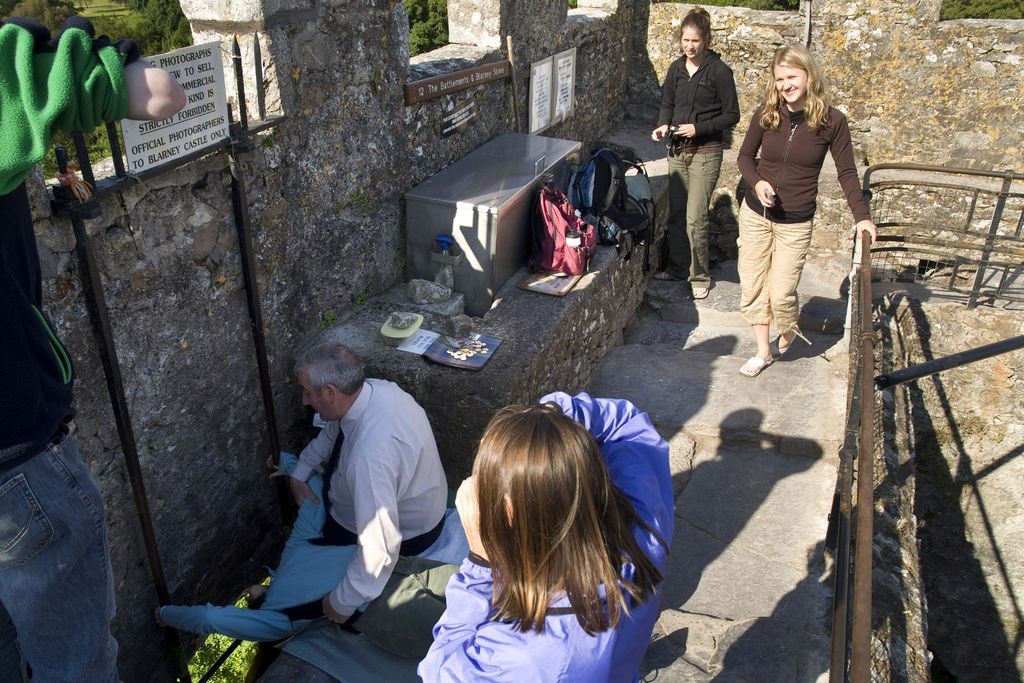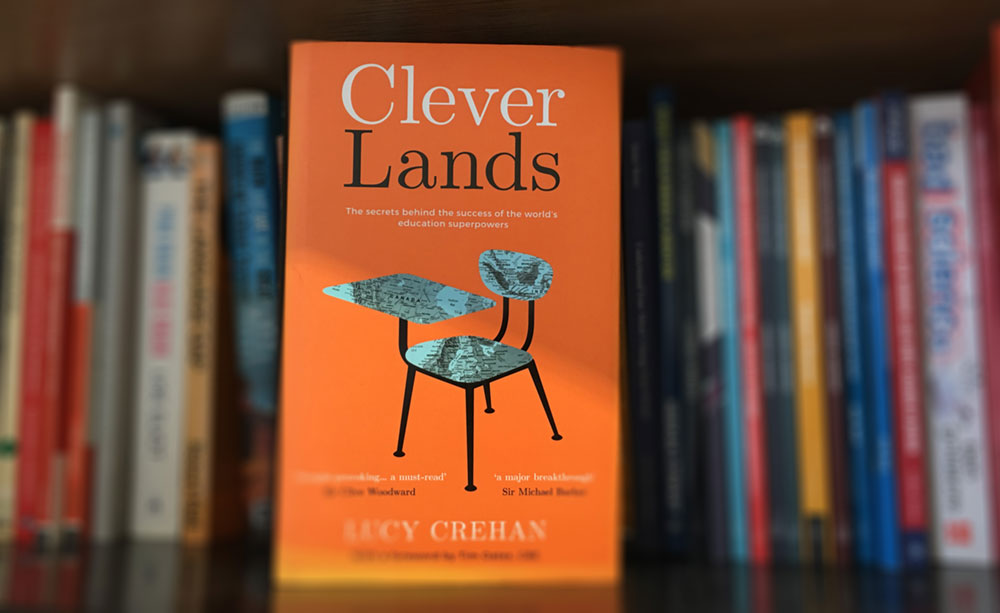By Dimitris Maroulis
There is a castle in Cork, Ireland, the Blarney Castle which hosts the Stone of Eloquence, kissing it you get the gift of the gab. Legend has it that an Irish king rescued a woman who fell into a river. As a reward the woman cast a spell over him, the ability to speak so well that he could persuade people to do whatever he wanted, under one condition: to kiss this particular stone on top of the Blarney Castle.
 Students, teachers and parents flock the place to kiss the stone. Many of them report that, in a magic way, they feel they can speak much more eloquently. If you really wish to develop your speaking skills, I think Blarney Castle deserves a visit.
Students, teachers and parents flock the place to kiss the stone. Many of them report that, in a magic way, they feel they can speak much more eloquently. If you really wish to develop your speaking skills, I think Blarney Castle deserves a visit.
Lucy Crehan, on the other hand, (https://lucycrehan.com/), a qualified teacher and education explorer was after a tall order: to research world’s top performing education systems. She used PISA results (the Programme for International Student Assessment, a triennial international survey which aims to evaluate educational systems worldwide by testing the skills and knowledge of 15-year-old students who are nearing the end of their compulsory education in three subjects: reading, mathematics and science) and its supplementary questionnaires that provide contextual information to identify the places to visit (no, Barnley Castle was not one of them, I am afraid). She spent about a month in each of the top PISA countries: Finland, Japan, Shanghai (China), Singapore and Canada. Lucy organized her research with the help of local teachers and she stayed at their homes, accompanying kids to school, talking with teachers, parents and school authorities. She also helped with schooling, delivering lessons, in English, or being other teachers’ assistant. She delved into the local bureaucracy and investigated each system’s background, origins, starting point and philosophy. She recorded hundreds of people commenting on their ideas and beliefs about their country’s education and education system. Her exploration lasted about a year and at the end of it she published a book with the title: Cleverlands, the secrets behind the success of the world’s education superpowers. The book was crowdfunded and there is a prologue by Tim Oates (Lucy’s supporter and mentor), CBE, Group Director of Assessment Research and Development, Cambridge Assessment which also funded part of her visits (Shanghai, China). The book has been translated into Greek (released May, 20th) and published by Πανεπιστημιακές Εκδόσεις Κρήτης, under the title (very illustrative indeed): Φυτώρια Ευφυΐας.
I am not going to spoil your reading, I will not reveal its content, in English or in Greek, it is a fascinating read simply because it is written in first person with great narratives and vignettes which are balanced by more scientific bits about some of the most contentious issues in education such as intelligence or the debate about nature or nurture. What I can, however, share with you are two things. First, some points that I can’t help mentioning as they are part of our life stereotypes and second, some ideas of how we can use Crehan’s conclusions and final thoughts in our 2020 classrooms or September resolutions.
Education Stereotypes
These five systems are really superb (Lucy’s preference is for Canada, though). To begin with, they do not prepare or spend time preparing for PISA tests. Teachers and students work for their own good and not for the test. This makes the test a reliable and valid source of information but also goes to show the importance education plays in these systems. More importantly though these systems strive for education effectiveness, in other words, they translate their methods into a solid, prosperous, well-educated society which drives its people further up year by year. They have invested in education and for all of them there are very particular reasons for doing so. Extra evening schools, parental control and pressure, high stake exams, crowded classrooms, admin inconsistencies, inequity, lack of resources, injustice and different socio-economic status are all present in these systems too. On the other hand, these problems are always identified and solved in the best possible manner, the key word here is integrity in every level. The Asian cultures are ahead in this area, having strong philosophical and religious foundations (Confucianism for example).
{loadmodule mod_random_image,call to action subscribe in articles}
September resolutions: our lesson from Crehan’s exploration.
Apparently, when the book ends Crehan offers five principles which have been inspired by her research and can really influence any educational system, not just to copy-paste from these top systems but to accommodate them in its own culture and ecosystem. These main principles refer to the basic ingredients of any educational setting. I have tried to translate these five principles into more practical recommendations for language teachers and school owners. They are actually self-evident initiatives that can really make the difference if we follow them consistently (consistency is one of the characteristics of the top five education systems, resilience is another one).
- Prepare language learners for their journey, scaffold their knowledge, do not leap, prepare also their conceptual understanding, do not translate into their mother tongue, let them carve their own path of knowledge. Teach basic things first and recycle systematically, teach phonics, the sound system and be meticulous with fundamental mental skills, such as handwriting, reading aloud. Spend time to prepare them how to work together and learn together.
- Plan ahead, plan well, plan with other teachers, plan in a coherent way, plan your lessons, your questions, your answers, rehearse your posture, your elicitation strategies, your replies, your praise comments, your exclamations. Divide your lessons into distinct parts, your syllabus into manageable, learnable, teachable entities/chunks that can be recycled (not revised). Teach fewer things in wider perspectives for all audiences, teach for the quality and not for the quantity. Scaffold the level of difficulty and make sure you move on to the next level only when all learners are ready for it.
- Think inclusively not exclusively, do not isolate, compartmentalize, separate, divide your learners. Create challenging activities and let all be part of the learning journey. Support in any way and at any cost those who need extra space, time, way to think, comprehend or imagine something. Do not excuse but instead try to inspire and encourage your learners to be a homogeneous group of language users and learners. Do not use summative assessment, use formative instead, try to use edumetrics and not psychometrics. Ask for learners’ feedback and spend time talking to them about their strengths and not about their weaknesses.
- Increase teachers’ salaries, pay rate and bonuses, respect the profession, give them breaks, lower the cognitive and pedagogical load, give them plenty of opportunities to develop themselves, to become better. Have breaks between the lessons, offer opportunities for teacher sessions where teachers talk and share plans, ideas and tips. Make this part of their weekly life. Socialise with other teachers, give teachers goals for self-improvement, expand their horizons, call them to talk about other disciplines; find new ideas from other disciplines. Share responsibility, raise standards, ask for extra training, help them in the search of trainers, conferences, seminars, fund them as much as you can. Encourage teachers develop empathy and emotional intelligence. Make yourself and your fellow teachers better.
- Finally, follow and shape specific accountability policies. Be accountable to your students, their parents, your teachers. Follow specific guidelines how to use accountability in your classes, and at your school. Spend time to negotiate these policies with all the interested parties and try to make a list of any improvement they recommend. Accountability has also got to do with examinations and the audit certificate. Design lesson observations and lesson plans presentations; the idea is the systematic improvement, problem detection and prevention. Accountability makes everybody better.
I strongly recommend Crehan’s book. I read it and I realized how many things can be done in the Greek educational system. There is one last, sad thing that comes from my readings: the happiness bars (my term!). Remember PISA collects contextual information to help in decision-making. There is a question addressed to students about how happy they are/feel at school. You can see the results. I think our first priority is to make our students feel happy in our schools.
